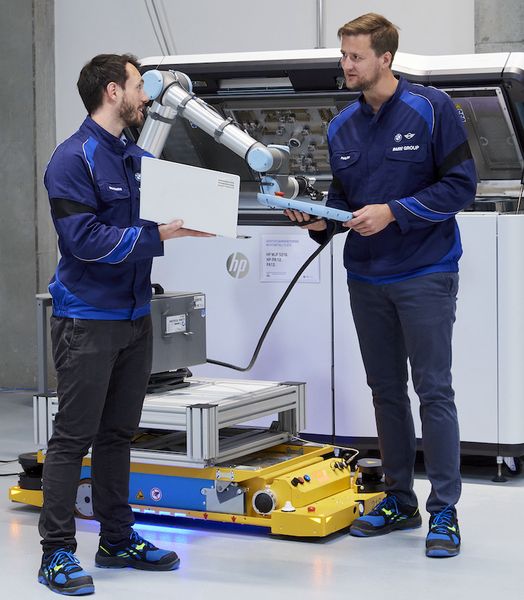
BMW has opened for operations a new additive manufacturing plant, but this is likely only the beginning.
This past July the company opened the new €15M facility, which is equipped with around 50 making machines, and focused specifically on additive techniques. The campus has over 80 staff producing 3D printed parts for BMW’s use, or for their clients.
BMW AM Plant
This plant is expected to produce at least 50,000 new parts per year, in addition to another 10,000 spare parts.
That’s impressive, but the real key here is not in part quantities, but part type: these machines can very easily produce almost any part design provided to them. They are 3D printers, after all, and require no lengthy tooling up to mass produce items; they can just start printing when asked.
That’s an incredible degree of flexibility now in the hands of BMW. They can use this to near-instantly change the design of a part for their production line, for example, without having to go to a supplier or external service.
The presence of a dedicated AM plant, as opposed to a “3D printer in the corner” is also important. Having staff dedicated to the technology will allow them to gradually gain increased experience in producing DfAM objects that will further optimize plant operations.
Additive Manufacturing Penetration
I’m not sure deeply the rest of the industry understands how profound this new plant could be for BMW, and indeed, the entire manufacturing world. What we are seeing is a big step in a transition toward additive technologies.
First 3D printers were used by designers to provide rough prototypes of products. Later, when materials improved, it became possible to produce end-use parts using the technology, albeit in low volumes only.
Now we are seeing an entire plant dedicated to this philosophy of manufacturing. That’s a far cry from the initial ways 3D printers were used.
The flexibility introduced by the plant will enable BMW to rapidly adapt to changing business conditions. They could, for example, quickly deploy a new part design without having to shut down production lines while waiting for traditional suppliers to tool up and make the new part.
Anything Factory
In a way, this is a version of something I called the “Anything Factory”, way back in 2011. I described the concept as follows:
“What we were seeing was in fact an ‘Anything Factory’. An array of machines capable of making literally anything. To make something different, no particular re-tooling is required as you might find with a traditional factory. Just load the new design and the Anything Factory will make it.”
BMW has an Anything Factory. Let that sink in.
I believe that once other manufacturers observe BMW’s approach, along with a few other similar plants, they will seek to do the same. Having this manufacturing power at the ready is clearly a massive advantage to any manufacturer.
It may be that this type of plant could, in coming years, be a de facto standard approach for manufacturers, where we would see Anything Factories across the land.
Once that happens the rate of change and improvements for products will simply skyrocket.
